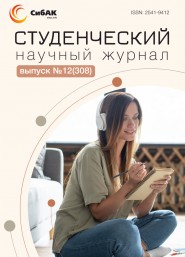Статья опубликована в рамках: Научного журнала «Студенческий» № 12(308)
Рубрика журнала: Социология
Скачать книгу(-и): скачать журнал часть 1, скачать журнал часть 2, скачать журнал часть 3, скачать журнал часть 4, скачать журнал часть 5, скачать журнал часть 6, скачать журнал часть 7
ADAPTATION OF INTERNATIONAL STUDENTS IN RUSSIA
ABSTRACT
This study explores the increasing international student mobility in Russian higher education, emphasizing the challenges and experiences faced by foreign students as they adapt to a new cultural and academic environment. It highlights the importance of effective support mechanisms and further research to enhance understanding of the adaptation process.
Keywords: international student mobility, cultural adaptation, higher education, russian universities.
Since the early 2000s, there has been a remarkable surge in international student mobility, largely fueled by the heightened ambition of countries and universities to attract candidates from around the world. To achieve this aim, educational institutions are implementing a diverse array of incentives, including scholarships, upgraded infrastructure, and initiatives encouraging overseas study. In contemporary academic discourse, the presence of international students is recognized as a vital marker of the internationalization of higher education. For students, the experience of studying abroad unlocks unique opportunities: engagement with various educational systems, cultural immersion, broadened social networks, and access to premier educational institutions.
The adaption of Russian higher education to the global academic milieu is particularly notable for its emphasis on attracting foreign students. The enrollment of international students serves as a strategic component in the broader internationalization strategy of Russian universities, enhancing both the quality of educational programs and the institutions' standing as competitive forces within the global education arena. Each year, Russian universities welcome hundreds of international students, predominantly from the former Soviet republics. While many of these students already speak Russian, making their transition easier, many people still require additional support to fully immerse themselves in Russia's cultural and social structure. This influx of international students is accompanied by a host of challenges tied to their adjustment. The process of cultural adaptation involves a spectrum of factors, such as psychological acclimatization, academic integration, and environmental adaptation. Successfully navigating this adjustment is crucial for their social integration. The journey into a new cultural context can be intricate and multifaceted. Although numerous studies illuminate the nuances of international students' adaptation, many are limited to narrowly defined cohorts, resulting in a fragmented understanding of the wider phenomenon.
For newcomers to Russia, the adaptation process encompasses not only familiarization with academic expectations and basic living arrangements in dormitories but also an in-depth engagement with the rich tapestry of Russian culture, traditions, social structures, and value systems. International students, especially those pursuing academic research, often face additional obstacles such as language barriers, unique dorm customs, and different cultural norms. A significant number of these students experience varying levels of culture shock when faced with these new realities.
Effective support for international students is a high priority for Russian universities, as it directly impacts their reputation on the global stage and influences international perceptions of Russia. Initiatives designed to help foreign students integrate into the academic, social, cultural, and athletic life of both the university and the surrounding community are essential for facilitating successful adaptation.
While certain support and adaptation programs initiated by universities have shown promise, their application is not always effective or well-publicized, underscoring the need for enhanced focus on this critical area within institutional frameworks.
It is important to recognize that some international students experience little to no challenges during their adaptation. For example, students from Belarus often adjust with relative ease due to the minor cultural differences.
Research on international student adaptation remains relevant, highlighting that the challenges associated with acclimatizing to a new environment persist for many individuals. While international academic exchanges and foreign student admissions are continuously explored in scholarly work, a universal solution remains unclear. Further investigation into both personal experiences and empirical data regarding adaptation is essential.
Continued research could lead to the development of more effective strategies for aiding student adaptation, ultimately enriching the educational experience for international students. Such efforts would also help cultivate a more inclusive and intercultural atmosphere within Russian higher education, enhancing the country's reputation in the global academic landscape.
References:
- Bauer E. A. Scientific and practical foundations of psychological and pedagogical support for the socio-psychological adaptation of adolescent migrants. [Text]: Dissertation of Doctor of Psychological Sciences. Nizhny Novgorod. – 2012. – 107 p.
- Zasedateleva, O.V. Sociocultural adaptation of foreign students in the modern system of Russian higher education / O.V. Zasedateleva // Philosophy of education. – 2011. № 3. – P. 302-306.
- Tikhonova E. G. Features of adaptation of foreign students in a regional university / E.G. Tikhonova // Regionalology. – 2010. № 2. – P. 149-155.


Оставить комментарий